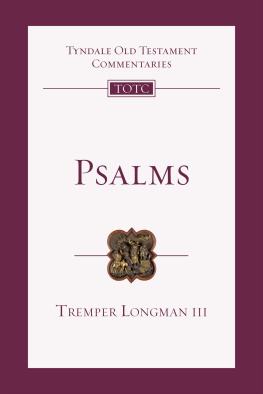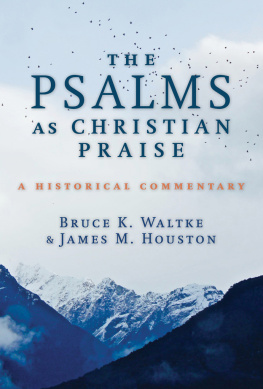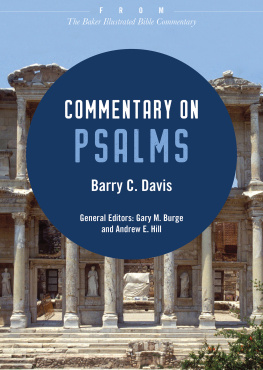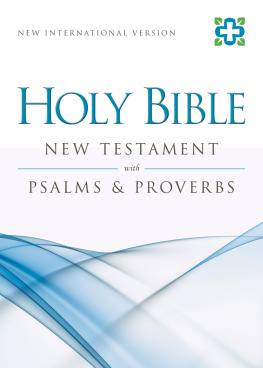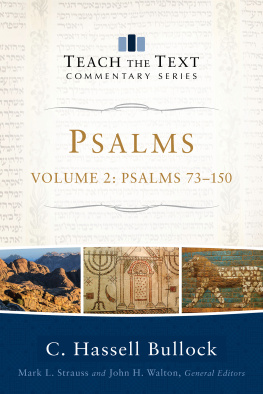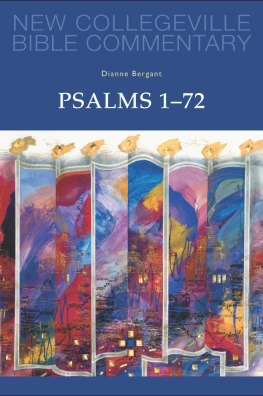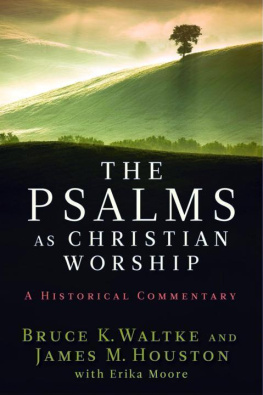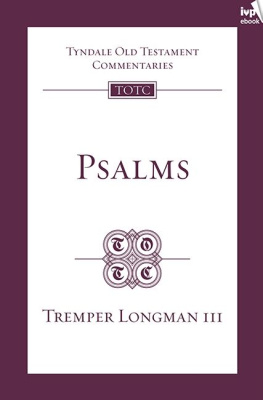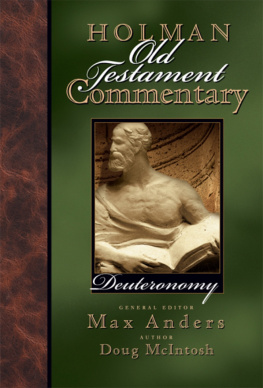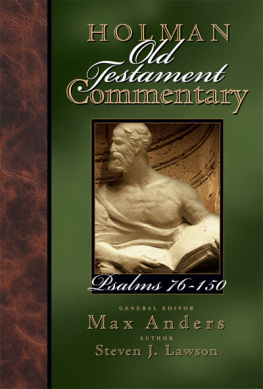TYNDALE OLD TESTAMENT
COMMENTARIES
VOLUMES 1516
PSALMS
InterVarsity Press, USA
P.O. Box 1400
Downers Grove, IL 60515-1426, USA
ivpress.com
2014 by Tremper Longman III
Tremper Longman III has asserted his right under the Copyright, Designs and Patents Act, 1988, to be identified as Author of this work.
All rights reserved. No part of this book may be reproduced in any form without written permission from InterVarsity Press.
InterVarsity Press, USA, is the book-publishing division of InterVarsity Christian Fellowship/USA and a member movement of the International Fellowship of Evangelical Students. Website: intervarsity.org.
Unless otherwise indicated Scripture quotations are from the Holy Bible, New International Version Anglicized, NIV Copyright 1979, 1984, 2011 by Biblica, Inc. Used by permission. All rights reserved worldwide.
First Published 2014.
Image: Erich Lessing/Art Resource, NY
ISBN 978-0-8308-9825-1 (digital)
ISBN 978-0-8308-4285-8 (print)
This digital document has been produced by Nord Compo.
TYNDALE OLD TESTAMENT
COMMENTARIES
VOLUMES 1516
SERIES EDITOR: DAVID G. FIRTH
CONSULTING EDITOR: TREMPER LONGMAN III
PSALMS
AN INTRODUCTION AND COMMENTARY
TREMPER LONGMAN III

General preface
The decision completely to revise the Tyndale Old Testament Commentaries is an indication of the important role that the series has played since its opening volumes were released in the mid-1960s. They represented at that time, and have continued to represent, commentary writing that was committed to both the importance of the text of the Bible as Scripture and a desire to engage with as full a range of interpretative issues as possible without being lost in the minutiae of scholarly debate. The commentaries aimed to explain the biblical text to a generation of readers confronting models of critical scholarship and new discoveries from the Ancient Near East, while remembering that the Old Testament is not simply another text from the ancient world. Although no uniform process of exegesis was required, all the original contributors were united in their conviction that the Old Testament remains the word of God for us today. That the original volumes fulfilled this role is evident from the way in which they continue to be used in so many parts of the world.
A crucial element of the original series was that it should offer an up-to-date reading of the text, and it is precisely for this reason that new volumes are required. The questions confronting readers in the first half of the twenty-first century are not necessarily those from the second half of the twentieth. Discoveries from the Ancient Near East continue to shed new light on the Old Testament, whilst emphases in exegesis have changed markedly. Whilst remaining true to the goals of the initial volumes, the need for contemporary study of the text requires that the series as a whole be updated. This updating is not simply a matter of commissioning new volumes to replace the old. We have also taken the opportunity to update the format of the series to reflect a key emphasis from linguistics, which is that texts communicate in larger blocks rather than in shorter segments such as individual verses. Because of this, the treatment of each section of the text includes three segments. First, a short note on Context is offered, placing the passage under consideration in its literary setting within the book, as well as noting any historical issues crucial to interpretation. The Comment segment then follows the traditional structure of the commentary, offering exegesis of the various components of a passage. Finally, a brief comment is made on Meaning, by which is meant the message that the passage seeks to communicate within the book, highlighting its key theological themes. This section brings together the detail of the Comment to show how the passage under consideration seeks to communicate as a whole.
Our prayer is that these new volumes will continue the rich heritage of the Tyndale Old Testament Commentaries and that they will continue to witness to the God who is made known in the text.
David G. Firth, Series Editor
Tremper Longman III, Consulting Editor
Authors preface
The book of Psalms is the heart of the Old Testament. Athanasius, the important fourth-century Church Father, called the Psalms an epitome of the whole Scriptures. In the same century, Basil, the Bishop of Caesarea, pointed out that this collection of poems presents a compendium of all theology, and Martin Luther, the sixteenth-century Reformer, called the book of Psalms a little Bible, and the summary of the Old Testament.
Indeed, the Psalms are not only the heart of the Old Testament; they are a pivotal witness and anticipation of Jesus Christ, and thus a perfect illustration of Augustines statement that the New Testa ment is in the Old concealed, and the Old is in the New revealed. Jesus made this clear when he told his disciples that the Psalms spoke of him (Luke 24:44).
It is crucial to note that the book of Psalms is not a theological textbook, but rather the libretto of the most vibrant worship imaginable. The book of Psalms does not only want to inform our intellect, but to stimulate our imagination, arouse our emotions and stir us on to holy thoughts and actions.
I begin by acknowledging the debt that I owe to Derek Kidner (19132008), the author of the Psalms commentary in the first edition of the Tyndale Old Testament Commentary series. I never met him, but he was the external reader of one of my very first books, How to Read the Psalms (IVP, 1987), and he gave me invaluable advice on how to organize the chapters of that book. I shudder to think that my commentary will be compared with his incisive, tightly written, insightful work, though I dare to offer it with the hope that it might help those who want to understand, teach and preach this powerful collection of poems, songs and prayers.
I also want to thank my best friend of the past forty-eight years (we met when we were thirteen), Dan Allender. Dan is a Christian psychologist who wants his counselling to be based on the Bible, and he has taught me more than anyone to read the Psalms as a mirror of the soul (Calvin). Together we wrote Cry of the Soul (NavPress, 1994), a book which looks at our emotional lives through the prism of the Psalms. My work with Dan significantly prepared me to write this commentary.
I also owe a debt of gratitude to Raymond Dillard (19441993), my teacher, mentor, friend and colleague, whose early death happened just over twenty years ago. He taught me to be honest with the text and, most importantly, to read the Old Testament in the spirit of Luke 24, in other words, Christologically. The reader will notice that, while honouring the original meaning of the text in its Old Testament context, I also offer a Christian reading of the psalm in the Meaning section of the commentary.
I have taught the Psalms in many different institutions over the thirty-some years of my teaching career. Unfortunately, there are too many students, some of whom are now professors and ministers, to name, but I thank them for the influence they have had on me as we have interacted over the text of the Psalms.

